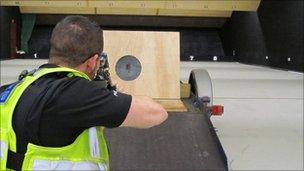Birmingham police to remove gunfire sensors
- Published

Police said the sensors had missed four confirmed shootings
Police are to remove gunfire sensors put up in parts of Birmingham because of "technical difficulties".
The Shotspotter Gunshot Location System was introduced in 2010 where there was a high number of firearm incidents.
But West Midlands Police admitted in August that the system was not as accurate as it had hoped and it had missed four confirmed shootings.
Of the 1,618 alerts from the system since November, only two were confirmed gunfire incidents.
'Not carrying on'
However, at a public meeting last month, 23 out of about 30 local residents backed the use of the system.
The force said a decision to end the project was taken at a Birmingham Community Safety Partnerships meeting last week which involves police and city council and fire service representatives.
Ch Supt Clive Burgess, who was overseeing Project Safe and Sound, said: "This has been an interesting pilot but we have always said that technology alone will not stop gun crime."
A spokesman said: "It's no secret there's been technical difficulties so we've decided not to carry on.
"We've always said it's a pilot and we've just decided not to carry on with it."
The cost of operating the system was also part of the decision to take the sensors down, he added.
It said its current cost of £24,000 this year would rise to about £40,000 next year.
'Always sceptical'
The devices were placed high up on buildings covered by the West and Central local policing unit, which includes Handsworth, Aston and Newtown.
Audio sensors were meant to detect a gunshot and send its location, in an alert, to police officers.
At the time they were put up, West Midlands Police said the devices had about an 85% accuracy rate and could detect a gunshot within 25m (82ft).
Raj Rattu from a Handsworth residents' group and part of the force's Trust and Confidence group, said he "wasn't surprised by the decision [to remove them]."
He said: "As a community we were always sceptical of the accuracy of the system when it was installed.
"Hopefully the money that is saved by ending this project will go back into front-line or intelligence-based policing, which is a more reliable way of tackling crime."
- Published23 August 2012
- Published31 January 2012
- Published20 August 2011
- Published1 June 2011
- Published9 December 2010